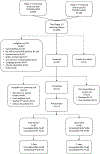Improving lifestyle behaviors during chemotherapy for breast cancer: The Lifestyle, Exercise, and Nutrition Early After Diagnosis (LEANer) Trial
- PMID: 38470431
- PMCID: PMC11214600
- DOI: 10.1002/cncr.35280
Improving lifestyle behaviors during chemotherapy for breast cancer: The Lifestyle, Exercise, and Nutrition Early After Diagnosis (LEANer) Trial
Erratum in
-
Correction to Improving lifestyle behaviors during chemotherapy for breast cancer: The Lifestyle, Exercise, and Nutrition Early After Diagnosis (LEANer) Trial.Cancer. 2025 Aug 1;131(15):e70018. doi: 10.1002/cncr.70018. Cancer. 2025. PMID: 40711344 No abstract available.
Abstract
Background: Little is known about improving physical activity (PA) and diet during and after chemotherapy for breast cancer. This secondary analysis examines changes in PA and diet quality during a yearlong intervention for patients with breast cancer undergoing chemotherapy and evaluates factors associated with these changes.
Methods: Newly diagnosed patients with breast cancer (N = 173) undergoing chemotherapy were randomized to a year-long nutrition and exercise intervention (n = 87) or usual care (UC, n = 86). Mixed models compared 1-year changes in PA and diet quality via the Healthy Eating Index (HEI)-2015 by study arm. Among the intervention group, baseline factors associated with change in PA and diet were assessed with multivariable linear and logistic regression.
Results: At 1 year, compared with UC, the intervention arm increased PA more (mean difference = 136.1 minutes/week; 95% CI, 90.2-182.0), participated in more strength training (56% vs. 15%; p < .001), and had suggestive improvements in HEI-2015 (mean difference = 2.5; 95% CI, -0.3 to 5.3; p = .08). In the intervention arm, lower fatigue was associated with improved PA (p = .04) and higher education was associated with improved HEI-2015 (p = .001) at 1 year. Higher HEI-2015 (p = .04) and married/living with someone (p = .05) were associated with higher odds of participating in strength training at 1 year.
Conclusions: This year-long lifestyle intervention for patients with breast cancer undergoing chemotherapy resulted in increases in PA and suggestive improvements in diet quality. Behavior change was associated with baseline fatigue, diet quality, education, and married/living with someone. Addressing these factors in interventions may improve uptake of lifestyle behaviors in trials during and after chemotherapy.
Keywords: breast cancer; chemotherapy; diet; exercise; lifestyle intervention; nutrition; physical activity; treatment.
© 2024 American Cancer Society.
Conflict of interest statement
Figures



References
Publication types
MeSH terms
Grants and funding
- P30CA016359-42/Yale Cancer Center Support Grant
- R25 CA203650/CA/NCI NIH HHS/United States
- UL1 TR001863/TR/NCATS NIH HHS/United States
- F31CA268894-01/Ruth L. Kirschstein National Research Service Award
- 5R01CA207753-04/CA/NCI NIH HHS/United States
- T32CA250803-02/Yale Cancer Prevention and Control Training Program
- TL1 TR001864/TR/NCATS NIH HHS/United States
- P30 CA016359/CA/NCI NIH HHS/United States
- F31 CA268894/CA/NCI NIH HHS/United States
- R25CA203650-05/TREC Training Workshop
- TL1TR001864/Yale Center for Clinical Investigation-Clinical Translational Science Award from the National Center for Advancing Translational Science, a component of the National Institutes of Health
- R01 CA207753/CA/NCI NIH HHS/United States
- T32 CA250803/CA/NCI NIH HHS/United States
- Breast Cancer Research Foundation
LinkOut - more resources
Full Text Sources
Medical

